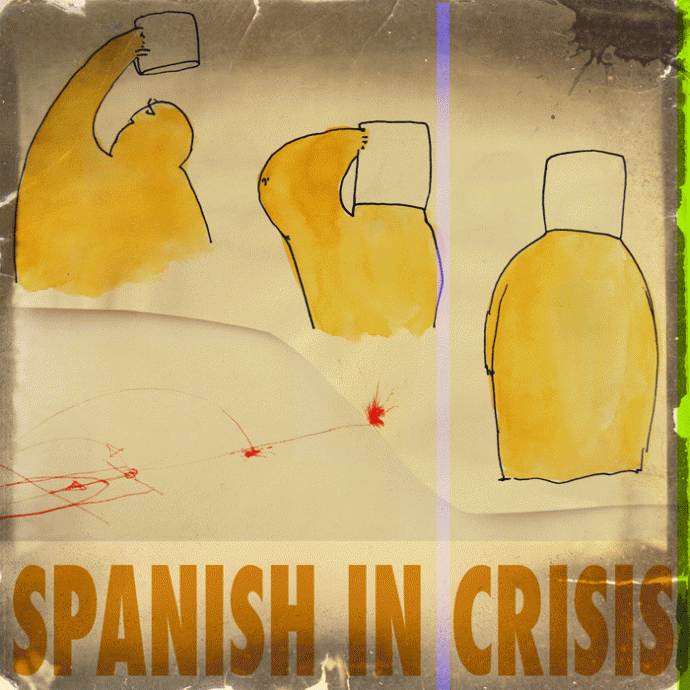A Spanish man who now lives, and runs his own business, in Berlin explains his view on the Spanish crisis. He left Spain seven years ago because of the looming crisis he felt was inevitable. Now he reflects on the sinking economy, and is not surprised his home country was one of the first victims of the world financial crunch. Youth unemployment is still rising, with 50% of under thirty-five year olds out of work, a statistic this man claims they only have themselves to blame for.
The difference between my generation and my parent’s was that only five percent of them could go to university, while eighty-five percent of our’s did. The problem with that is, we now have more highly educated people in certain fields, but there are no jobs for them after graduation. When I studied computer science, I wanted to stay and finish the course, but didn’t see the point because I knew I would never find a job. The jobs I wanted don’t exist and I would be left with a shitload of debt. Spain’s education system is deeply flawed.
I decided to leave Spain in 2006. The economy was booming, even stronger than Germany, but I knew it couldn’t last forever and I didn’t want to live on credit. It was strange: there was no industry, no jobs, but everybody had money, borrowed money, living the high life. I had other personal reasons for leaving, but mainly I didn’t want to be part of this kind of society based on pretend money. It was so easy to get a loan, you just had to sign some papers. One day someone was broke and the next day, after a visit to the bank, they had 200,000 Euros. It was crazy – they had no job, no house, nothing. Then with the borrowed money, they could buy a new house, a car, without any hard work, and they were twenty-two years old.
I mostly blame individuals of Spanish society for the crash. Yes, we got a lot of money from Europe because we wanted it, but we didn’t know what to do with it, we didn’t invest. We have always been happy with easy money, without the need to work really hard. I believe Spain is its own worst enemy. I mean the one thing it did have going for it was tourism, and, if nothing else, that could have been a way for the country to make money. But the lifestyle is too laid back, and generally Spanish people don’t speak English or even make an effort to learn.
I mean the positive side to this recession could be the fact that people will pull together for a common cause. We have seen that recently with the efforts of the occupy movement for example, but what they want and if they are achieving any of their aims, or even if they all have the same goals, is another matter.
Spain has always had a good sense of community and in a crisis they are certain to pull together. That is the Spanish way of life – people do everything together all the time. To me, it was almost as if it seemed immoral to be alone. If you do spend time on your own in Spain, people constantly always ask you what’s wrong. It’s hard to be an individual, and as a result there are a lot of sheep-people following each other. The bad side of this is you need time on your own occasionally, to create, to reflect, realise things from your own mind. Perhaps if Spanish people were not so self indulgent they would not be in this mess. The party life in Spain is great, but when you party so much you don’t have time to work and don’t want to. That suits the Spanish way of life, but if you buy into the capitalist way of life, like Spain did, without putting the work in, you end up falling along way, and it’s a lot harder to climb back to where you once were.
I don’t know what the answer is for Spain now. If they borrow more, the debt will worsen and they’ll have no way of investing in any industries, because there aren’t any. They could do with making themselves more self-sustainable by limiting their resource consumption, i.e. fossil fuels. I get the feeling that in Spain they don’t take responsibility, always thinking that something else will help them out. It’s as if God will sort out this mess. Spain is one of the biggest followers of Catholicism in Europe, but ironically one of the worst hit by the recession.
For the sake of Spain, I hope they help each other out and stop putting the blame on others, they are a source of their own destruction in my eyes. Putting blame on bankers or politicians is a waste of time. These people aren’t your friends or there to help you – they run businesses and if you take from them you are going to have to pay your debts back. I think they will have to seek alternative ways of living, like going back to more rural basics of life, and that’s fine. We grow our own vegetables and use solar power, but then when you get sick and you can’t afford modern medicine, what then? The people that are going to feel this most are the young, party going, and vulnerable people who didn’t see it coming. They wanted it all but hadn’t worked for it, and bankers were happy to watch that happen and take advantage.
The only time I’ll go back to Spain is for holidays, for the sun. I knew when I left in 2006 I would never go back to live.







